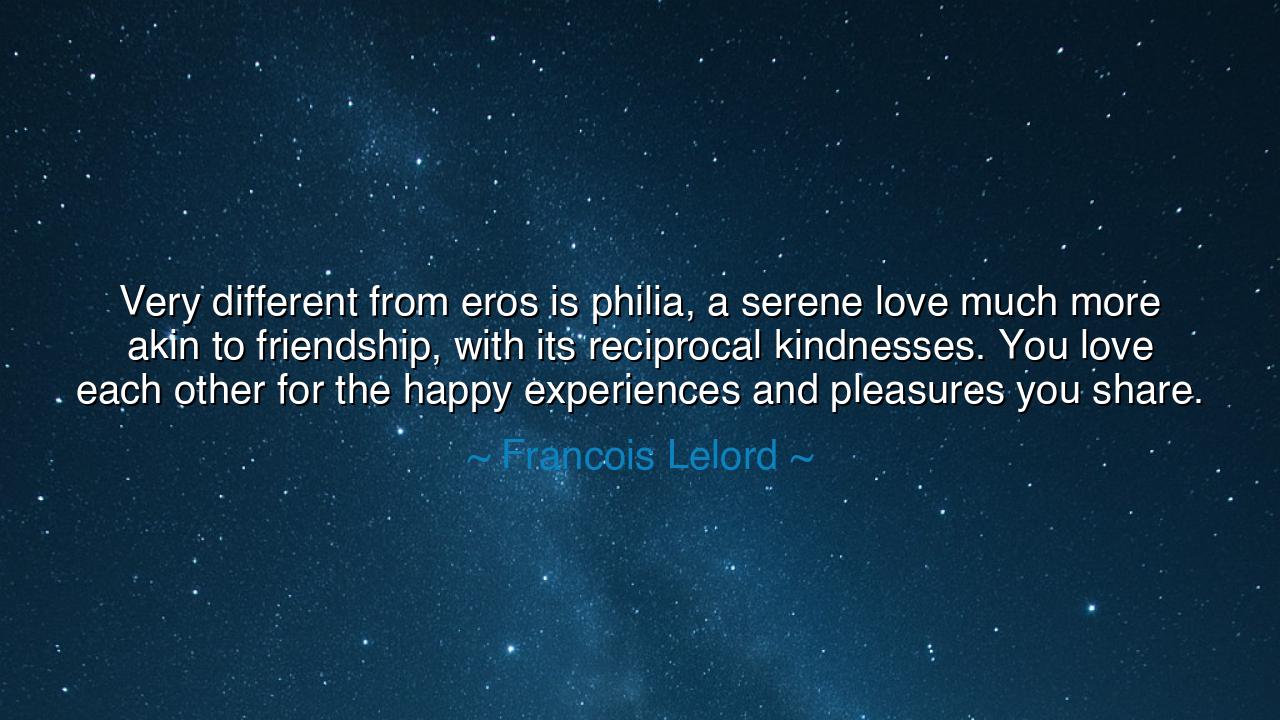
Very different from eros is philia, a serene love much more akin
Very different from eros is philia, a serene love much more akin to friendship, with its reciprocal kindnesses. You love each other for the happy experiences and pleasures you share.






“Very different from eros is philia, a serene love much more akin to friendship, with its reciprocal kindnesses. You love each other for the happy experiences and pleasures you share.” Thus spoke Francois Lelord, the modern philosopher and storyteller whose writings explore the quiet art of happiness. In these few lines, he touches a truth known to the ancients and yet too often forgotten in our age of haste—that there are many kinds of love, and not all burn with passion or possessiveness. Some, like philia, are calm, enduring, and born of mutual goodwill. They are the friendship of souls, where affection is not consumed by desire, but sustained by understanding and joy.
The origin of this insight reaches far beyond Lelord himself, tracing back to the wisdom of Aristotle, who in his Nicomachean Ethics spoke of three kinds of love: eros, the passionate love of desire; agape, the selfless love of divine compassion; and philia, the warm and steady love of friendship. Where eros is fire—bright, consuming, often fleeting—philia is sunlight, gentle and constant, giving life without destruction. Lelord, drawing upon this ancient teaching, reminds us that not all great loves are tragic or storm-swept. Some are built not on longing, but on companionship, laughter, and shared peace. It is the love that does not burn, but endures.
In philia, there is no competition, no striving to possess. It is a reciprocal love, a harmony of giving and receiving. Two souls walk together not to conquer one another, but to delight in each other’s presence. They share moments, memories, and joys, finding in these simple exchanges the quiet fulfillment that no passion can rival. The one who has found philia has found a kind of paradise on earth—a refuge from loneliness and vanity. It is the love that asks not “What can I gain?” but “How can we share?” And it is in this sharing that both hearts grow light and free.
Consider the ancient bond between Socrates and Plato, master and pupil, united not by power or possession but by the joy of thought and dialogue. They found happiness in the exchange of ideas, in the pursuit of wisdom together. Their friendship was not born of emotion’s fever, but of the mutual delight in truth. This was philia—a love grounded in respect, illuminated by learning, made sacred by the act of giving and receiving insight. Long after Socrates’ death, Plato carried his teacher’s wisdom like a flame in his heart, proving that philia survives even when one of the friends has gone.
Lelord’s words also carry a gentle warning. In our time, love is too often confused with eros—the fleeting intoxication of attraction and desire. We chase passion, thinking it will fulfill us, only to find ourselves restless and alone when its fire burns out. Yet, philia teaches another way: to seek the steady companionship that warms the soul instead of the flesh, to value presence over possession, laughter over lust, constancy over conquest. For it is not the heart that burns the brightest that brings peace, but the one that beats in rhythm with another’s.
The essence of philia lies in reciprocity. It is not one-sided devotion, nor the sacrifice of self, but the union of equals. In friendship, each person offers their best—kindness, honesty, and goodwill—and receives the same in return. This balance creates serenity, for there is no fear of betrayal or loss. It is not passion that sustains such love, but trust. And this trust is born from shared experience—the memories of laughter, the understanding forged in trial, the quiet gratitude that grows in the presence of another’s steadfast heart.
Let this, then, be the lesson of Lelord’s teaching: seek in life the serene love of friendship, not only the fiery ecstasy of romance. Nurture the relationships where you can speak freely, where joy is mutual, and kindness flows without measure. Be the friend who listens without judgment, who forgives without resentment, and who delights in another’s happiness as in their own. Share not only your triumphs but your tears, for it is in shared humanity that philia takes root.
For when the fires of youth fade and the passions of eros grow dim, it is philia that remains—the light of companionship, the warmth of shared memory, the peace of a love that asks for nothing but presence. Such love is not loud or showy; it is quiet, steady, and eternal. And as Francois Lelord teaches, it is in this love that the human heart finds its true contentment—when it no longer seeks to burn, but to shine.






AAdministratorAdministrator
Welcome, honored guests. Please leave a comment, we will respond soon